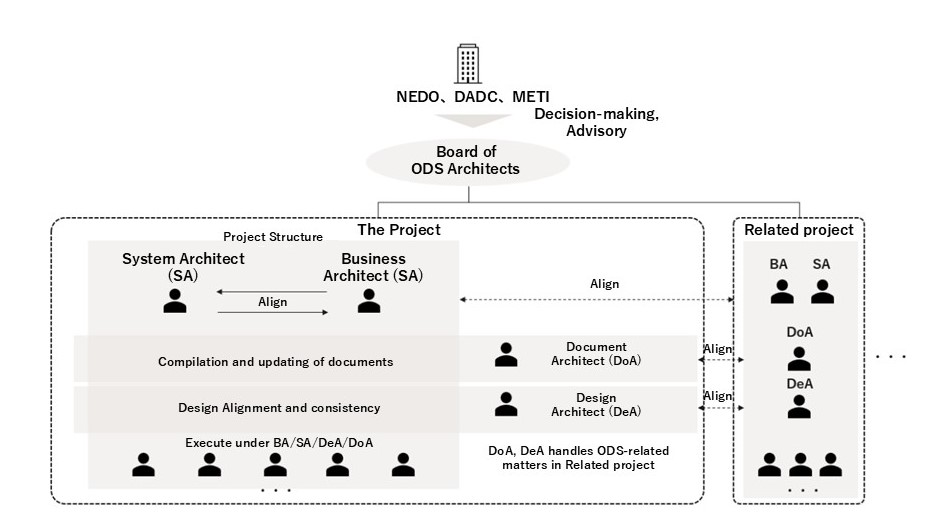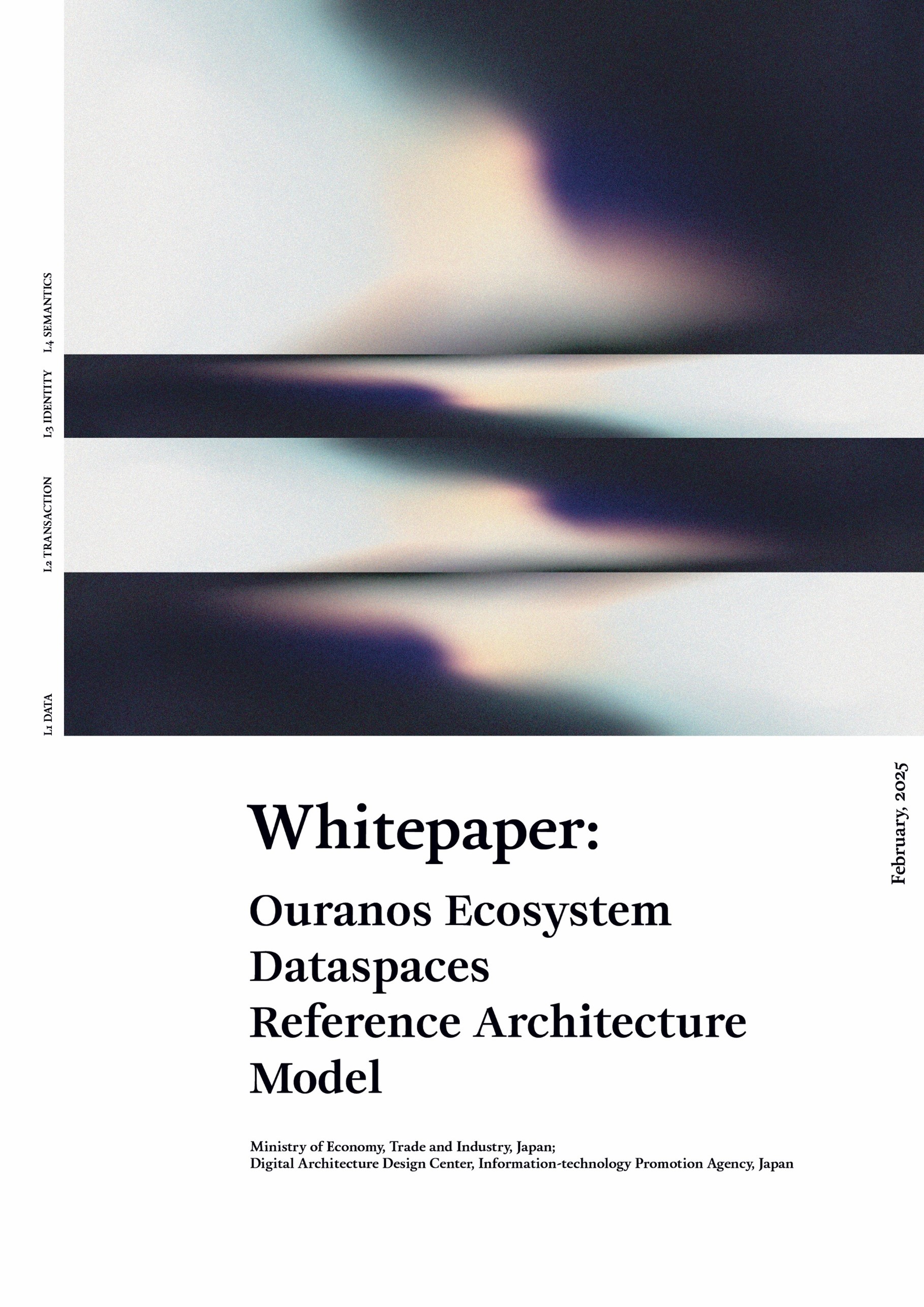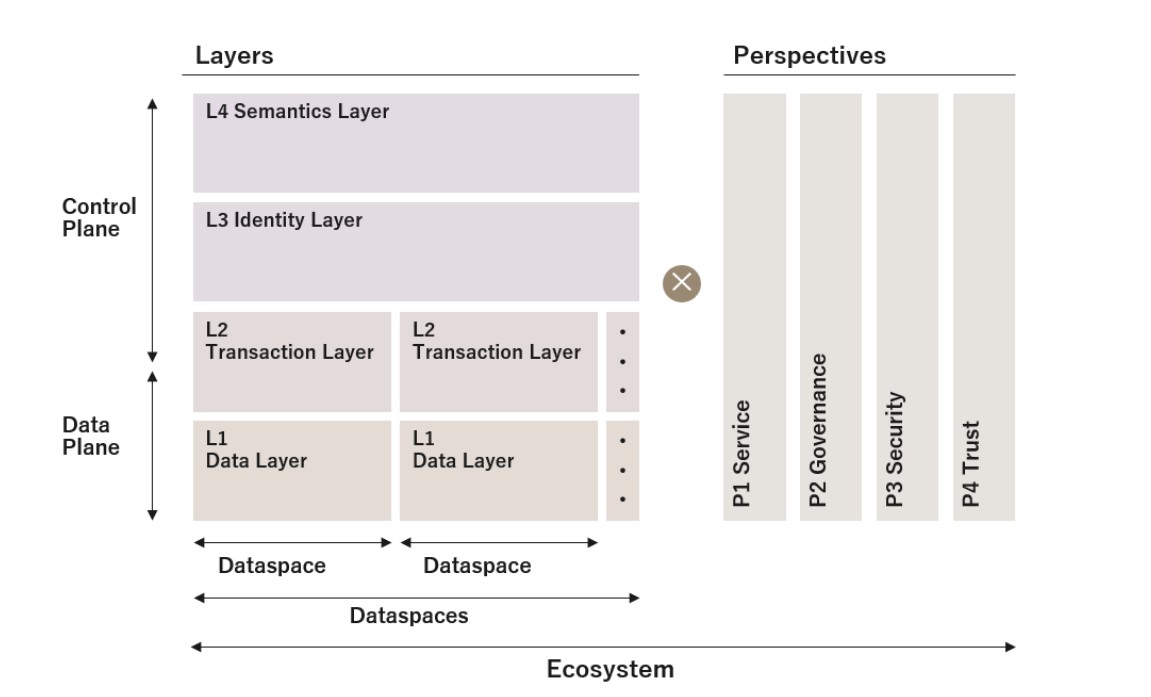IPA takes leadership and responsibilities on dataspace architecture for global interoperability
Release Date:Aug 1, 2025
Last Updated:Aug 5, 2025
Information-technology Promotion Agency, Japan
Spearheading strategic data sharing across sectors, enterprises, industries, and national borders amidst “Data Is Eating the World”
Information-technology Promotion Agency, Japan (IPA) has commenced advisory, as a neutral organization leading the Ouranos Ecosystem Dataspaces (ODS), to selected project contractors within the “Project for the Development and Pilot of a Data Sharing System to Realize the Ouranos Ecosystem” (the Project) by New Energy and Industrial Technology Development Organization, Japan (NEDO). IPA takes leadership and responsibilities on designing the architecture of the ODS, and, in the Project, ensures vendor-agnostic and internationally interoperable dataspaces without any dependency to specific companies. Through the Project, IPA compiles a technical reference document (Reference Architecture Model) for ODS implementations, leading to the realization of strategic data sharing across divisions, enterprises, industries and national borders while ensuring data sovereignty.
Overview
Digital Architecture Design Center, Information-technology Promotion Agency, Japan (IPA DADC) has commenced advisory for developing dataspace protocols and middleware, as a neutral organization leading ODS, to selected project contractors within the “Project for the Development and Pilot of a Data Sharing System to Realize the Ouranos Ecosystem” (Note 1) by NEDO. Through the Project, IPA DADC takes a leadership and responsibilities on designing the architecture of the ODS to ensure vendor-agnostic and internationally interoperable dataspaces without any lock-ins to specific companies.
In recent years, DADC has been examining technical paradigms to realize strategic data sharing with sovereignty of the data providers across divisions, enterprises, industries, and national borders, under the Oranos Ecosystem initiative, to achieve the societal implementation of “data spaces” (Note 2) in the industry.
This fiscal year, DADC plans to revise the “Ouranos Ecosystem Data Spaces Reference Architecture Model” (ODS-RAM) (Note 3) for further expansion and penetration of the ODS within the industry. This technical reference document was developed and published in collaboration with the Ministry of Economy, Trade and Industry, Japan (METI), in result of architecture design activities of the IPA DADC. Additionally, DADC plans to compile the ODS Guidebook to assist the ODS participants in building and joining data spaces.
-
Note 1
-
Note 2IOFDS (International Open Forum on Data Society) defines:“Data Space” is a decentralized ecosystem with common policy and rules defined by a governance framework that enables secure and trustworthy data transactions between participants while supporting trust and data sovereignty.
-
Note 3Whitepaper: Ouranos Ecosystem Dataspaces Reference Architecture Model
- Chief Architect: Michitaka Tsuda
Members with authority and responsibilities
The architecture design for ODS and the advisory activities for selected project contractors in the Project will be carried out under the Chief Architect with the following members:
Chief Architect: Michitaka Tsuda

- Department
-
Information Analyst Officer, Digital Architecture Design Center
- Biography
-
Michitaka Tsuda graduated from Osaka University. Tsuda demonstrated early leadership by founding a fintech software startup during his university years (Founder, CEO/CTO). Following his career of business consultant at MC Digital Inc., Tsuda entered the Ministry of Economy, Trade and Industry through the National Examination for Comprehensive Service. At METI, Tsuda was responsible for Unmanned Aircraft System Lines policy and Ouranos Ecosystem policy at Commerce and Information Policy Bureau. In shaping Ouranos Ecosystem policy, Tsuda designed and authored the ODS-RAM as Chief Architect. Additionally, as a project leader of the PIVOT Project (a new policy initiative for young professionals within the Minister's Secretariat), Tsuda authored the “Digital Economy Report: Survival Strategies for a Digital Market without Sanctuary, Amidst Data is Eating the World.”
| Roles | Authority and responsibilities | Person-in-charge |
|---|---|---|
| Chief Architect(ODS-CA) |
Responsible for and authorized to lead the architecture design of the ODS, ensuring vendor-agnostic and interoperable dataspaces, independent of specific companies.
Will manage all architects within the agency involved in the ODS, including Business Architects (ODS-BA), System Architects (ODS-SA), Document Architects (ODS-DoA), and Design Architects (ODS-DeA), leading the ODS from a neutral standpoint.
|
Michitaka Tsuda
Information Analyst Officer,
Digital Architecture Design Center |
| System Architect(ODS-SA)/Document Architect(ODS-DoA) | Responsible for and authorized to ensure the implementation of reducing technical bloat and guaranteeing technical neutrality for the ODS-related systems, as well as the compilation of the entire documentation. |
Kimitaka Tamura
Senior Expert,
Digital Architecture Design Center |
| Design Architect(ODS-DeA) | Responsible for and authorized to ensure the alignment of branding and design direction for the ODS. |
Naoto Yamashita
Senior Expert,
Digital Architecture Design Center |
| Business Architect (Project for Enhancing the Distribution of Carbon Footprint Data in the Battery Traceability Sector)(ODS-BA) |
Responsible for and authorized to lead business requirements from an industry-optimal perspective, maintaining a neutral stance independent of specific enterprises, regarding the business of carbon footprint data sharing in the battery traceability sector. |
Takuya Sumida
Project Leader,
Battery and Automotive Project,
Architecture Implementation Department, Digital Architecture Design Center
|
| Business Architect (Project for the Development of a Chemical Substance Data Sharing System)(ODS-BA) |
Responsible for and authorized to lead business requirements from an industry-optimal perspective, maintaining a neutral stance independent of specific enterprises, regarding the business of chemical substance data sharing (Note 4). |
Kiyoto Furuta
General Manager for Chemical and Circular Management Platform,
Digital Architecture Design Center
|
| IPA General Supervisor | Responsible for and authorized to ensure the effective operations of the agency's architects. |
Hideki Hanami
Deputy Director General,
Digital Architecture Design Center
|
- Figure 1 below is excerpt from NEDO’s official website to provide an overview of the Project. Readers may refer to the website for more details:
-

Figure1.Project Overview
- Readers may refer to the detail at:
- The file above corresponds to the "List of Architects" in "Detail information" of NEDO’s “Project for the Development and Pilot of a Data Sharing System to Realize the Ouranos Ecosystem” at:
-
Note 4Concurrently serve as the Business Architect for “Project for the Development of a Chemical Substance Data Sharing System/ Development of Chemical Substance Data Traceability Management System” (C-1) within NEDO's “Project for the Development and Pilot of a Data Sharing System to Realize the Ouranos Ecosystem”, as DADC.
Background
As warned in the “Digital Economy Report: Survival Strategies for a Digital Market without Sanctuary, Amidst Data is Eating the World” (Note 5), published by the Ministry of Economy, Trade and Industry, data that defines the competitiveness of software creating added value in services is truly the “oil” of the digital industry amidst “data is eating the world”, driven by the AI revolution.
With the reversal of roles between software and hardware becoming typical in industries such as automotive, satellite, and robotics, software-oriented strategic data sharing is no longer just a management issue but one that determines an enterprise's competitive advantage itself.
Foreseeing the advent of such a world, Japan is promoting a series of initiatives as the “Ouranos Ecosystem.” This aims to realize DFFT (Data Free Flow with Trust), an international concept advocated by Japan, by connecting multiple systems and promoting data sharing across divisions, companies, industries, and national borders. Through this concept, we advance data, system, and business collaboration, striving to strengthen enterprise and industrial competitiveness through public-private cooperation.
-
Note 5
Globally Pioneering Models and Industrial Activities

In February 2025, IPA DADC and METI, jointly released the “ODS-RAM”, a technical reference document for the Ouranos Ecosystem initiative, as a globally pioneering model, taking into account international industrial trends and the efforts of various governments.
The ODS-RAM is a service-oriented architecture model designed to expedite the societal implementation of dataspaces within the industry. (Figure2) The ODS-RAM presents a technical paradigm that allows for more flexible adaptation to the characteristics of industry and market structures, and commercial practices while maintaining a certain level of logical compatibility with the International Dataspaces Reference Architecture Model (IDS-RAM).
-

Figure3. Layers and Perspectives of the ODS-RAM
- Readers may refer to the Whitepaper for more details:
Furthermore, as an industrial activity, in March 2025, IPA and Catena-X Automotive Network e.V. have successfully completed a Proof of Concept (PoC) for interoperability between two independent data spaces, demonstrating that different ecosystems can be interconnected while maintaining regional sovereignty. The results of this PoC serve as a crucial starting point for future interoperability efforts, not only for the ODS (Automotive Industry Data Sharing) and Catena-X but also for other data spaces that both ecosystems aim to connect with.
Future Directions
Through these activities, IPA DADC promotes strategic data sharing with data sovereignty, tackling pressing societal challenges such as labor shortages, intensifying natural disasters, and the transition to decarbonization—issues that require cross-divisional, -enterprise, -industry, and -border responses. By driving data-driven innovation, IPA DADC continues contributing to Japanese economic growth in the global market.
Contact information
IPA Digital Architecture Design Center
-
E-mail

Change log
-
Aug 5, 2025
Added a link to "Roles and Organizational Chart for the Three Related Organizations Involved in the Project"
-
Aug 1, 2025
Initial release
